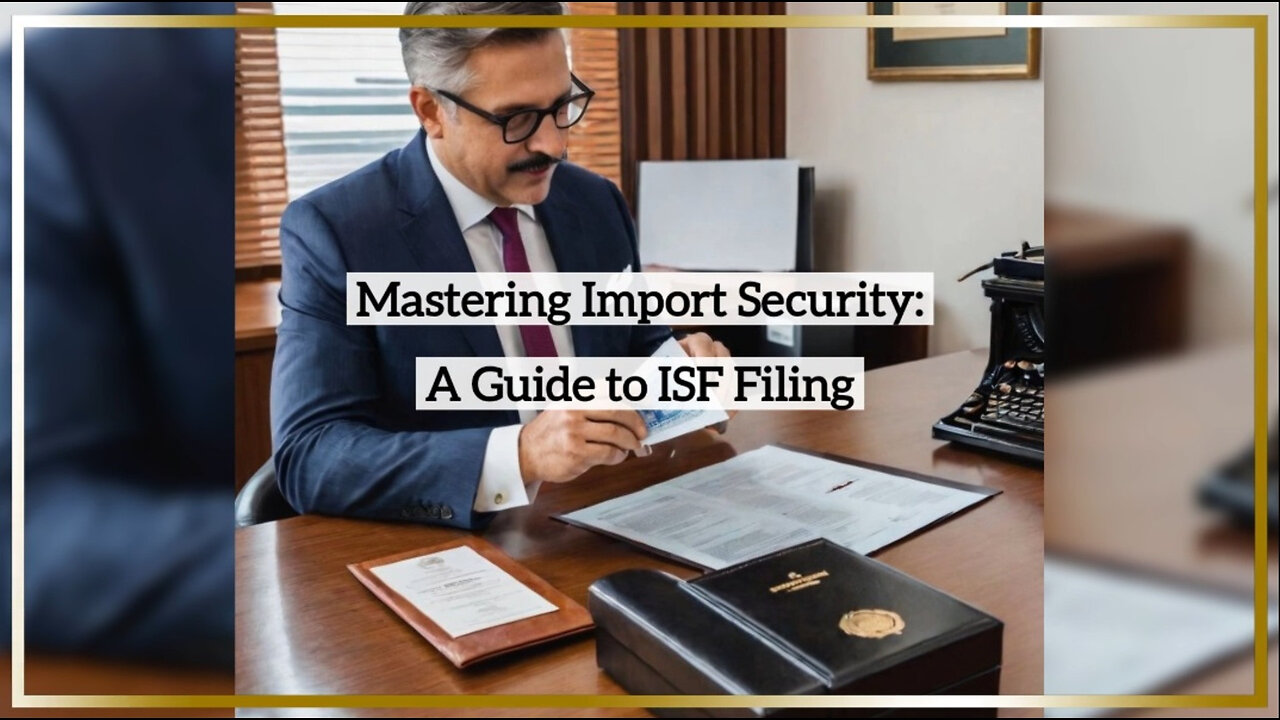Premium Only Content

Securing Your Cargo: The Vital Role of Importer Security Filing
ISF Filer || isf@isffiler.com || 858-280-9374 || www.isffiler.com
This video provides an in-depth explanation of Importer Security Filing (ISF) and its importance in securing cargo. It discusses the requirements of ISF filing, including the necessary information, timing, and compliance obligations for importers. The role of customs brokerage in the ISF process is highlighted, focusing on their expertise in customs regulations and their ability to assist importers in accurately and efficiently fulfilling their ISF requirements. The benefits of customs brokerage services are explained, such as reducing the risk of fines or penalties, streamlining communication with CBP, and ensuring compliance with other customs regulations. Additionally, the video emphasizes how the ISF program contributes to preventing security risks and bolstering supply chain security. Overall, importers can safeguard their cargo and contribute to national security by adhering to the ISF program with the assistance of customs brokers.
#usimportbond
#isfcustomsbroker
#uscustomsclearing
#isfentry
Video Disclaimer Here: This video is intended for educational purposes and has no affiliation with US government entities.
0:32 ISF requires importers to provide specific details about their cargo before it is loaded onto a vessel bound for the United States, helping Customs and Border Protection (CBP) identify potential security risks like smuggling and terrorism.
1:00 Importers must submit their ISF filing at least 24 hours before cargo loading, including essential information like manufacturer details, container stuffing location, Harmonized System codes, and quantities, to comply with ISF requirements.
1:30 Customs brokers play a vital role in assisting importers with ISF obligations by ensuring accurate and timely filing, minimizing errors, communicating with CBP, and ensuring compliance with other U.S. Customs regulations.
1:57 ISF program aims to prevent security risks by providing advance cargo information to CBP, enabling them to target high-risk shipments and safeguard national interests, reducing the risks posed by contraband, counterfeit goods, and other security threats in the supply chain and the economy.
-
 46:42
46:42
The Officer Tatum
2 hours agoLIVE Zuckerberg ENDS Censorship on Meta as Dana White JOINS Board + MORE | Officer Tatum Show EP 35
22K11 -
 LIVE
LIVE
ZWOGs
2 hours ago🔴LIVE IN 1440p! - Trying Out The New Tarkov Wipe, MARVEL RIVALS, then Helldivers 2! - Come Hang Out!
335 watching -
 27:07
27:07
Matt Kim
13 hours agoPeople Got MAD About Our Usury Podcast | Matt Kim #132
35.6K11 -
 1:00:32
1:00:32
The Dan Bongino Show
5 hours agoThe Biggest FBI Scandal In History Is Unfolding (Ep. 2395) - 01/07/2025
694K2.06K -
 1:02:09
1:02:09
TheAlecLaceShow
4 hours agoGuest: Tim Kennedy | Cybertruck Bomber | Trump Certified | Trudeau Resigns | The Alec Lace Show
17.6K2 -
 1:01:01
1:01:01
PMG
4 hours ago $2.12 earned"Gates Wants to Meet With Trump & Are Alternative Treatments Really Covered Up?"
20.6K11 -
 LIVE
LIVE
The Dana Show with Dana Loesch
2 hours agoMETA'S ZUCKERBERG ENDS FACT-CHECKING PROGRAM | The Dana Show LIVE On Rumble!
652 watching -
 47:59
47:59
The Rubin Report
4 hours agoListen to ‘The View’ Crowd Gasp as Sunny Hostin Accidentally Reveals How Ignorant She Is
92.7K106 -
 28:29
28:29
Grant Stinchfield
3 hours ago $1.03 earnedMeta Claims to End Censorship... This is More about Protecting Meta Than Speech!
22K5 -
 1:08:56
1:08:56
Bare Knuckle Fighting Championship
4 hours agoThe Bare Knuckle Show with Brian Soscia
21K